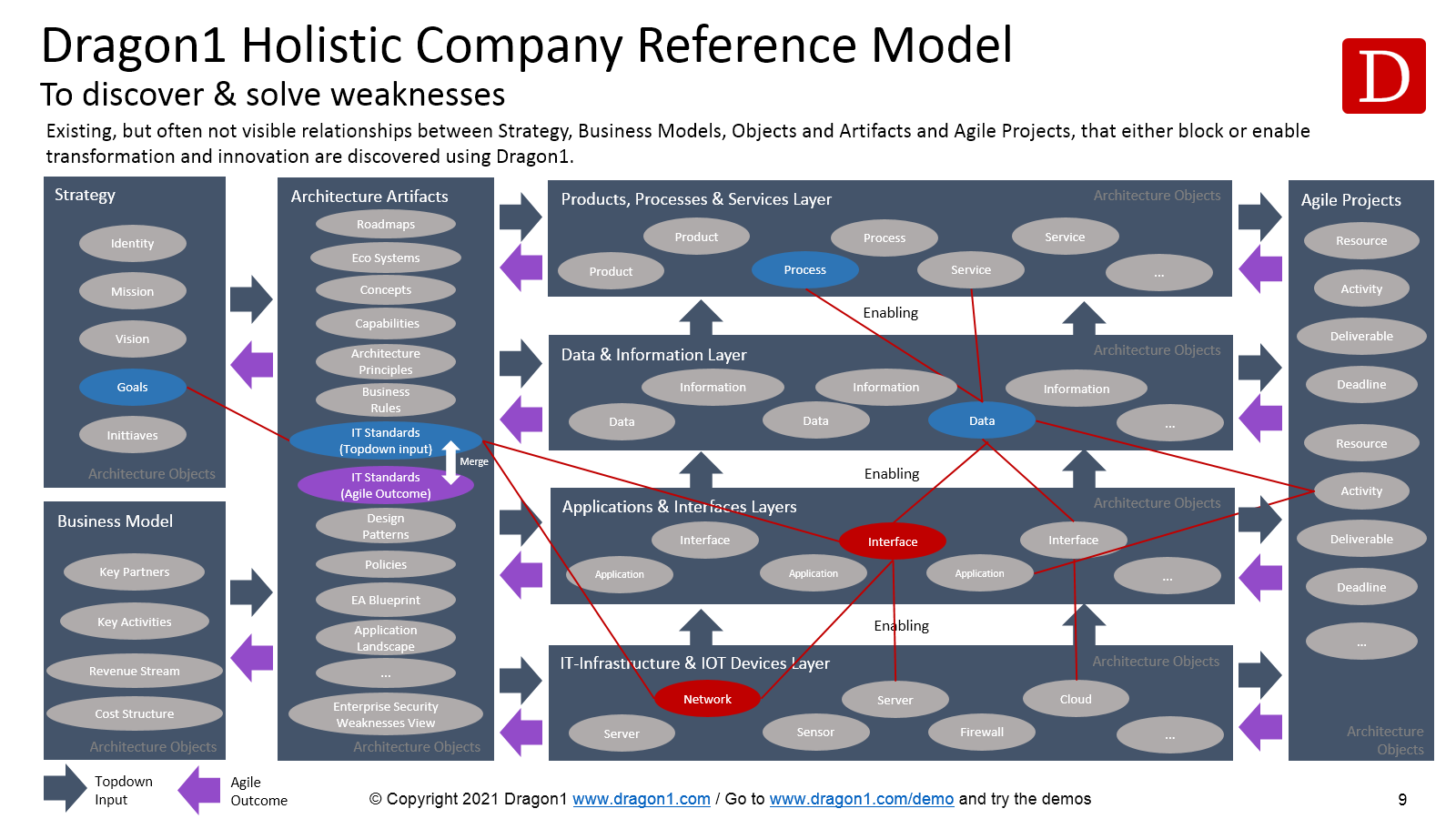Dragon1 Icon for
Enterprise CREATED BY ANONYMOUS, CREATIVE COMMONS LICENSE
CREATED BY ANONYMOUS, CREATIVE COMMONS LICENSEDragon1 Definition for
Enterprise:
An Enterprise is defined as an undertaking, a journey, or a project that is complex and has many risks involved in realizing ambitious goals. The risks are constantly calculated, evaluated, justified, and controlled. The undertaking is done by individuals or organizations.
Let us define an Enterprise
What is an enterprise, and what are the different types of enterprises? Why should an enterprise visualize its markets, products and clients, mission, ambition, strategy, security, systems, processes, applications, information, and data? Please read it here!
Definition
What is enterprise meaning?
An Enterprise is defined as an undertaking, a journey, or a project that is complex and has many risks involved in realizing ambitious goals. The risks are constantly calculated, evaluated, justified, and controlled. The undertaking is done by individuals or organizations.
Definitons of Enterprise in different contexts
The term enterprise can have various definitions depending on the context in which it is used. Here are some different definitions:
- Business Organization: In a business context, an enterprise refers to a commercial organization or company engaged in various economic activities, such as manufacturing, trading, or providing services. It is often used interchangeably with the term "business."
- Entrepreneurial Endeavor: An enterprise can also refer to a specific entrepreneurial project or undertaking. It represents a concerted effort to create, develop, or manage a business venture to generate profits or achieve a particular objective.
- Large-Scale Business: In some contexts, an enterprise may specifically denote a large or significant business entity, often characterized by its size, complexity, and organizational structure. This definition highlights the scale and scope of the business.
- Systematic Approach: An Enterprise can refer to a systematic and methodical approach to solving complex problems or managing resources. It often involves a strategic and organized effort to achieve specific goals in business, government, or other domains.
- Government or Public Sector: In government and public administration, an enterprise can refer to a government agency, department, or institution responsible for a specific set of functions or services. It represents a distinct organizational unit within the government.
- Software and IT: In the realm of information technology (IT), an enterprise may refer to a large-scale software system or application designed to meet the needs of a large organization. Enterprise software is often used to support various business processes and functions.
- Entrepreneurship and Innovation: Enterprise can also be synonymous with entrepreneurship and innovation. It represents the initiative, creativity, and risk-taking spirit that drives individuals or organizations to pursue new opportunities and solutions.
- Social or Environmental Endeavor: In a broader context, enterprise can refer to initiatives aimed at addressing social or environmental issues, such as social enterprises or environmental enterprises. These organizations prioritize social or environmental impact alongside financial sustainability.
- Daring and Initiative: In a more abstract sense, enterprise can denote a sense of daring, adventure, and boldness in pursuing new ideas, projects, or challenges. It implies a readiness to take risks and embrace innovation.
- Synonym for Business: In everyday language, "enterprise" is sometimes used as a synonym for "business" or "company," especially when discussing commercial activities or economic matters.

Enterprise Organization Holistic Overview.
Try Dragon1 Free
Examples of Enterprises
We delve into five diverse examples of enterprises that exemplify these characteristics.
5 examples of enterprises
Example #1: NASA and SpaceX
Organizations like NASA and private companies such as SpaceX embark on ambitious journeys to explore outer space. These missions involve complex technology, substantial financial investments, and constant risk assessment.
Example #2: Boeing and Toyota
Undertakings in large-scale manufacturing, such as automobile production or aerospace engineering, are monumental enterprises. These projects demand vast resources, meticulous supply chain management, and intricate production processes. Risks related to quality control, supply chain disruptions, and market demand fluctuations are ever-present. Organizations like Boeing and Toyota are prime examples of companies that navigate these complexities to achieve their ambitious manufacturing goals.
Example #3: Goldman Sachs and JPMorgan Chase
Financial institutions, including banks and investment firms, operate within a volatile financial landscape. Their business enterprise is centered on managing financial assets, lending, and investment activities. In this context, the risks involve market fluctuations, credit default, and regulatory compliance. These organizations, such as Goldman Sachs and JPMorgan Chase, constantly calculate and evaluate risks to justify their investment strategies and maintain financial stability.
Example #4: Airbnb and Uber
Technology start-ups epitomize the essence of ambitious enterprises. These fledgling companies strive to disrupt established industries or create new ones through innovative products or services. Intense competition, rapid technological advancements, and financial risks mark the journey. Founders must meticulously calculate their market entry, evaluate evolving customer needs, justify their unique value propositions, and employ agile strategies to control risks and seize opportunities. Well-known examples include companies like Airbnb and Uber, which have transformed the hospitality and transportation sectors.
Example #5: Pfizer and Moderna
In the pharmaceutical sector, enterprises revolve around the quest to develop life-saving drugs and medical breakthroughs. Intricate research, rigorous clinical trials, regulatory hurdles, and the constant evaluation of safety and efficacy risks characterize these endeavors. Companies like Pfizer and Moderna exemplify the painstaking journey of bringing groundbreaking medications to market, where the stakes are high, but the rewards can be transformative.
If you know of great example enterprises that should be added here, please submit your suggestion to info@dragon1.com.
Visualize your Enterprise
Use dynamic enterprise visualizations to visualize and manage your enterprise successfully for your most critical areas.
Example of Enterprise Visualization Security.
Read Also
Dragon1 Trial Account
Are you interested in visualizing your enterprise? Sign up today for your Trial Account
If you have comments or remarks about this Dragon1 term or definition, please mail to specs@dragon1.com.